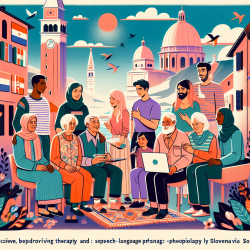In the dynamic field of Speech-Language Pathology (SLP), staying updated with the latest research is crucial for providing the best care. The 2023 Brazilian Consensus on Sleep-Focused Speech-Language-Hearing Sciences offers a treasure trove of insights that can significantly enhance the outcomes for children. Here’s how practitioners can implement these findings in their practice.
Why Focus on Sleep?
Efficient, restful sleep is vital for regulating various systems that play a critical role in a child's well-being, similar to breathing, eating, and speaking. Sleep disorders can negatively impact metabolic functioning, contributing to various diseases, including cardiovascular issues. More importantly, poor sleep affects physical and mental development, cognitive aspects, attention, memory, learning, mood, and overall quality of life.
Key Findings from the Consensus
The Brazilian Consensus identified several essential topics that practitioners should focus on:
- Professional Training: Sleep-focused SLP should be practiced exclusively by professionals with a degree in SLHS and specific training in sleep sciences.
- Assessment and Diagnosis: SLPs should assess sleep disorders as part of their diagnostic process, especially in cases of orofacial myofunctional disorders related to sleep-disordered breathing (SDB).
- Treatment Modalities: Specific orofacial myofunctional therapy for SDB should be conducted alone or in combination with other treatments.
- Interdisciplinary Collaboration: SLPs should work in interdisciplinary teams, referring patients for comprehensive sleep assessments and collaborating with other professionals.
Practical Implementation Tips
Here are some actionable steps for practitioners:
- Update Your Training: Ensure you have specific training in sleep sciences. Attend workshops, courses, and conferences to stay updated.
- Integrate Sleep Assessments: Include sleep assessments in your diagnostic process. Use questionnaires like the Epworth Sleepiness Scale or the Pittsburgh Sleep Quality Index.
- Utilize Myofunctional Therapy: Implement orofacial myofunctional therapy as part of your treatment for children with SDB. This can help improve airway function and overall sleep quality.
- Collaborate with Other Professionals: Work closely with physicians, dentists, and other healthcare providers to offer a comprehensive treatment plan for your patients.
Encouraging Further Research
While the consensus provides a solid foundation, ongoing research is essential. Practitioners are encouraged to contribute to the body of knowledge by conducting studies and sharing their findings.
By implementing these recommendations, practitioners can significantly improve the outcomes for children struggling with sleep-related speech and language issues. For a deeper dive into the research, read the original paper: Brazilian Consensus on Sleep-Focused Speech-Language-Hearing Sciences - 2023 Brazilian Sleep Association.










